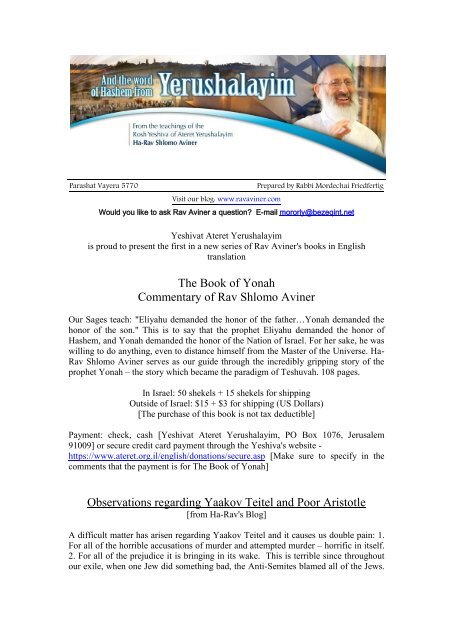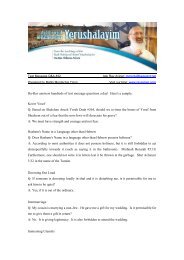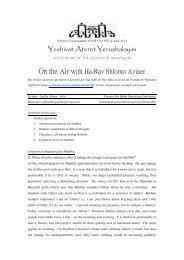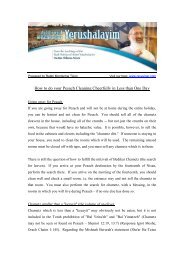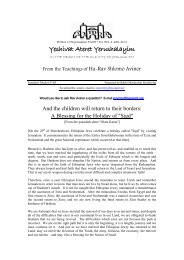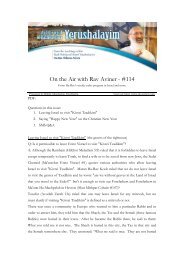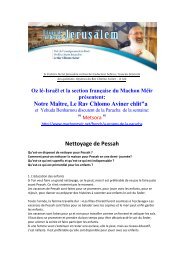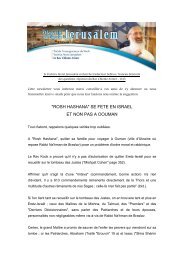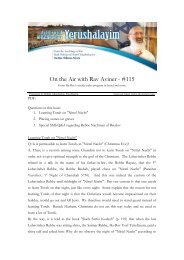The Book of Yonah Commentary of Rav Shlomo Aviner ...
The Book of Yonah Commentary of Rav Shlomo Aviner ...
The Book of Yonah Commentary of Rav Shlomo Aviner ...
Create successful ePaper yourself
Turn your PDF publications into a flip-book with our unique Google optimized e-Paper software.
Parashat Vayera 5770 Prepared by Rabbi Mordechai Friedfertig<br />
Visit our blog: www.ravaviner.com<br />
Would you like to ask <strong>Rav</strong> <strong>Aviner</strong> a question? E-mail mororly@bezeqint.net<br />
Yeshivat Ateret Yerushalayim<br />
is proud to present the first in a new series <strong>of</strong> <strong>Rav</strong> <strong>Aviner</strong>'s books in English<br />
translation<br />
<strong>The</strong> <strong>Book</strong> <strong>of</strong> <strong>Yonah</strong><br />
<strong>Commentary</strong> <strong>of</strong> <strong>Rav</strong> <strong>Shlomo</strong> <strong>Aviner</strong><br />
Our Sages teach: "Eliyahu demanded the honor <strong>of</strong> the father…<strong>Yonah</strong> demanded the<br />
honor <strong>of</strong> the son." This is to say that the prophet Eliyahu demanded the honor <strong>of</strong><br />
Hashem, and <strong>Yonah</strong> demanded the honor <strong>of</strong> the Nation <strong>of</strong> Israel. For her sake, he was<br />
willing to do anything, even to distance himself from the Master <strong>of</strong> the Universe. Ha-<br />
<strong>Rav</strong> <strong>Shlomo</strong> <strong>Aviner</strong> serves as our guide through the incredibly gripping story <strong>of</strong> the<br />
prophet <strong>Yonah</strong> – the story which became the paradigm <strong>of</strong> Teshuvah. 108 pages.<br />
In Israel: 50 shekels + 15 shekels for shipping<br />
Outside <strong>of</strong> Israel: $15 + $3 for shipping (US Dollars)<br />
[<strong>The</strong> purchase <strong>of</strong> this book is not tax deductible]<br />
Payment: check, cash [Yeshivat Ateret Yerushalayim, PO Box 1076, Jerusalem<br />
91009] or secure credit card payment through the Yeshiva's website -<br />
https://www.ateret.org.il/english/donations/secure.asp [Make sure to specify in the<br />
comments that the payment is for <strong>The</strong> <strong>Book</strong> <strong>of</strong> <strong>Yonah</strong>]<br />
Observations regarding Yaakov Teitel and Poor Aristotle<br />
[from Ha-<strong>Rav</strong>'s Blog]<br />
A difficult matter has arisen regarding Yaakov Teitel and it causes us double pain: 1.<br />
For all <strong>of</strong> the horrible accusations <strong>of</strong> murder and attempted murder – horrific in itself.<br />
2. For all <strong>of</strong> the prejudice it is bringing in its wake. This is terrible since throughout<br />
our exile, when one Jew did something bad, the Anti-Semites blamed all <strong>of</strong> the Jews.
But what could we do? – <strong>The</strong> non-Jews are not our brothers. We did not have great<br />
expectations. But now our brothers are doing the same thing.<br />
What does this have to do with Aristotle? Approximately 2,200 years ago, Aristotle<br />
tried to teach us about logical deduction. An example <strong>of</strong> proper logical deduction:<br />
Moshe is a person. People have legs. Conclusion: Moshe has legs. But sometimes<br />
people make improper deductions: Moshe is bald. Moshe is a person. Conclusion:<br />
All people are bald. This is incorrect. But people make such deductions. Yigal Amir<br />
murdered the Prime Minister, z"l. Yigal Amir is a Religious-Zionist. Conclusion:<br />
Religious-Zionists are murderers <strong>of</strong> the Prime Minister. <strong>The</strong>re can obviously be<br />
further incorrect logical deductions regarding Herzeliya from where Yigal Amir came<br />
or regarding Bar Ilan University where he studied, etc.<br />
In our case, there are those who make the incorrect deduction: Yaakov Teitel stands<br />
accused <strong>of</strong> being a murderer. Yaakov Teitel lives in the settlement <strong>of</strong> Shevut Rachel.<br />
Conclusion: <strong>The</strong> residents <strong>of</strong> Shevut Rachel are murderers. Or even broader: He is a<br />
settler, so all settlers are murderers. Or even broader still: He is a Religious-Zionist,<br />
so all Religious-Zionists are murderers. Aristotle has tried for 2,200 years to<br />
convince us <strong>of</strong> the faulty nature <strong>of</strong> such deductions. Poor Aristotle.<br />
It is one thing when we are concluding that all people are bald, but here such<br />
deductions destroy the most important thing we have: Love and brotherhood, peace<br />
and friendship. When we are united, we can overcome any challenge from within or<br />
from without. When we look for blemishes among others, we only hurt ourselves.<br />
We are forgetting that the residents <strong>of</strong> Shevut Rachel, the Settlers and Religious-<br />
Zionists are good people, as are Jews who are not residents <strong>of</strong> Shevut Rachel, who are<br />
not Settlers and who are not Religious-Zionists. We are obligated to increase love<br />
and brotherhood, peace and friendship among the Nation <strong>of</strong> Israel.<br />
On the Parashah –<br />
One Difference between Avraham Avinu and Lot<br />
[Sichot Ha-<strong>Rav</strong> Tzvi Yehudah – Bereshit p. 171 – edited by <strong>Rav</strong> <strong>Aviner</strong>]<br />
Both Avraham Avinu and Lot welcomed in guests in our parashah, but there is a<br />
major difference between them. <strong>The</strong>re is a story about a great Rabbi who was delayed<br />
in his travels and was unable to find lodging at such a late hour. He knocked on the<br />
doors <strong>of</strong> the Jewish houses, but did not reveal that he was an important person. He<br />
knocked on the door <strong>of</strong> a wealthy person and the owner yelled at him: "This is not a<br />
hotel! This is a private home! No and no!" In the end, a simple Jew welcomed him<br />
in. His identity became known in no time and word quickly spread throughout the<br />
city that the famous Rabbi was there. Everyone came to visit him, including the<br />
wealthy man who had said that his house was not a hotel, and he jumped forward and<br />
said: "Rabbi, Rabbi, come with me. I will provide you with a spacious room." This is<br />
the difference between Avraham Avinu and Lot. Avraham Avinu welcomed in "men"<br />
(Bereshit 18:2), while Lot welcomed in "angels" (ibid. 19:1). It is certainly<br />
worthwhile to welcome in angels, they are important, but Avraham Avinu welcomed<br />
in men. We clearly see the humanity and righteousness that we must possess in
elation to simple people. <strong>The</strong> incredible greatness Avraham Avinu possessed toward<br />
Hashem flowed directly into his humanity towards human beings.<br />
<strong>Rav</strong> <strong>Aviner</strong> on…<br />
<strong>The</strong> Honor <strong>of</strong> the Temple Mount<br />
[from the Israeli newspaper "Makor Rishon"]<br />
Like many other things, the subject <strong>of</strong> the Temple is beyond all human intellect. We<br />
must therefore stand before it in trembling and not assume that we can understand its<br />
holiness with our human capabilities. But the opposite extreme is also destruction,<br />
and we must learn with our intellect as much as we can, to try to understand, to study<br />
and analyze. We must learn about the Temple from the perspective <strong>of</strong> Halachah and<br />
thought as individuals and in conference and public lectures.<br />
Many great Torah scholars expressed their opinion in a clear and unambiguous<br />
manner that one should not even touch the Temple Mount. For example, our Rabbi,<br />
Ha-<strong>Rav</strong> Tzvi Yehudah, was not less idealistic, courageous and dedicated than those<br />
pushing to allow visits to the Temple Mount, and he spearheaded the entire settlement<br />
enterprise, and at the same time, he ruled that it was forbidden to touch the Temple<br />
Mount. One who says to stay away from the Temple Mount is not necessarily weak,<br />
and one who is passionate about going up is not necessarily strong.<br />
<strong>The</strong> claim that in relation to the Temple Mount we are like the G-d-fearing, Anti-<br />
Zionist Jews in relation to the Land <strong>of</strong> Israel is correct. But what does it matter? Is<br />
everything <strong>of</strong> equal value? Have we reached the state that we are incapable <strong>of</strong><br />
distinguishing between different levels <strong>of</strong> holiness? <strong>The</strong>re are certainly many great<br />
things about those who are passionate about going on to the Temple Mount, but the<br />
idea itself – in my view – is a complete mistake and dangerous.<br />
<strong>The</strong> Temple Mount – it time has not arrived yet. What time has arrived? To increase<br />
building the Nation through love and faith.<br />
Stories <strong>of</strong> Rabbenu – Our Rabbi, Ha-<strong>Rav</strong> Tzvi Yehudah Ha-Cohain Kook<br />
Military Exemption for Yeshiva Students<br />
<strong>Rav</strong> Shear Yashuv Cohain, son <strong>of</strong> the Nazir and <strong>Rav</strong> <strong>of</strong> Haifa, related that during the<br />
War <strong>of</strong> Independence, there was a major dispute between Rabbis – including within<br />
Yeshivat Mercaz Ha-<strong>Rav</strong>, if yeshiva students should be drafted into the military. <strong>The</strong><br />
students followed the path <strong>of</strong> our Rabbi and the Nazir and were active in the Haganah,<br />
Etzel and Lechi. During the waiting period, after the UN votes and before the end <strong>of</strong><br />
the British Mandate, <strong>Rav</strong> Shear Yashuv would learn in the yeshiva. One day he left<br />
the yeshiva and saw a broadside with the huge title that Maran Ha-<strong>Rav</strong> Kook opposed<br />
drafting yeshiva students into the army, and it included harsh quotes from one <strong>of</strong> his<br />
letters regarding this issue. He was unsure what to do and left deep in thought when<br />
he bumped into our Rabbi. Our Rabbi, who recognized his state, said: "Shear<br />
Yashuv, what happened? Why are you so upset and pale?" He told him what
happened and pointed to the broadside. Our Rabbi roared: "This is a distortion! This<br />
is a total distortion!" over and over.<br />
After he calmed down, he explained that these quotes were taken from a letter <strong>of</strong><br />
Maran Ha-<strong>Rav</strong> Kook to <strong>Rav</strong> Dr. Hertz, Chief Rabbi <strong>of</strong> England, regarding being<br />
drafted into the British army, which the latter presented to the government. Yeshiva<br />
students who arrived in London from Russia and Poland as refugees <strong>of</strong> World War<br />
One and were learning Torah were left <strong>of</strong>f the list <strong>of</strong> those exempt from military<br />
service (for example, priests, who were exempted). Maran Ha-<strong>Rav</strong> Kook admonished<br />
him, and said that this has nothing to do with the war for Jerusalem. <strong>Rav</strong> Shear<br />
Yashuv encouraged and aided our Rabbi to publish a booklet clarifying this issue.<br />
During the difficult battle for the Old City in Jerusalem, the Jewish community was<br />
defeated and <strong>Rav</strong> Shear Yashuv, who was badly wounded on his leg, and the<br />
surviving fighters were taken into Jordanian captivity. He thus did not merit seeing<br />
the publication <strong>of</strong> the booklet he initiated. After approximately eight months and the<br />
establishment <strong>of</strong> the State, <strong>Rav</strong> Shear Yashuv was released and taken to Zichron<br />
Yaakov for rehabilitation. Within a day, at a time when buses were rare, our Rabbi<br />
appeared outside his window. He entered the room, hugged and kissed him and burst<br />
out crying. He removed a small booklet from his pocket and gave it to him. It was<br />
dedicated to <strong>Rav</strong> Shear Yashuv.<br />
From <strong>Rav</strong> <strong>Aviner</strong>'s <strong>Commentary</strong> on Birkat Ha-Mazon,<br />
entitled Shir Ha-Ma’a lot<br />
On the Sheva Berachot – "He created everything for His honor"<br />
Baruch Hashem, you got married! You must remember that the purpose <strong>of</strong> marriage<br />
is not solely for one person to benefit from another, but rather to increase the honor <strong>of</strong><br />
Hashem. Rabbi David Abudraham wrote in the name <strong>of</strong> Rabbi Meir Ha-Levi<br />
Abulafia: This blessing was established in order to remind us that the essence <strong>of</strong> the<br />
wedding is to increase people in the world, "And this is the honor <strong>of</strong> God, since the<br />
honor <strong>of</strong> the Creator is only through His creations." "Everything which the Holy One,<br />
Blessed be He, created in His world, He only created for His honor, as it says: ‘Every<br />
one that is called by My Name, for I have created him for My glory, I have formed<br />
him, and I have made him’" (end <strong>of</strong> Pirkei Avot, Yeshaya 43:7). We must always<br />
remember for the reason that we are found here on earth: To increase the honor <strong>of</strong><br />
Hashem.<br />
Special thank you to Fred Casden for editing the Ateret Yerushalayim Parshah Sheet


